Recent Updates
12/25/2024 12:00 PM
Our favourite cars of 2024: Dacia Duster
12/25/2024 12:00 PM
My Week In Cars Christmas Special (ep.120)
12/25/2024 12:00 PM
Are you the biggest car nerd? Ultimate motoring trivia quiz
12/25/2024 12:00 PM
Dig this: We drive (and fly) mad 1300bhp JCB monster truck
12/24/2024 12:00 PM
Hyundai vs Porsche? Old stereotypes are fading fast
12/24/2024 12:00 PM
Our favourite cars of 2024: Analogue Automotive Supersport
12/24/2024 12:00 PM
Inside the UK’s busiest car factory at Christmas
12/24/2024 12:00 PM
Dacia to Ferrari: Testers trade cars in Ultimate Secret Santa
12/24/2024 12:00 PM
Government invites car makers to help reshape ZEV mandate
12/23/2024 12:00 PM
How Manthey gave the 911 GT3 RS 1000kg of downforce
EV, Hybrid, Hydrogen, Solar & more 21st century mobility!

Where we're going, we don't need roadsA century ago, a Scottish explorer brought the first Christmas tree a remote Scottish island. We reprise her adventure with the help of an Ariel Nomad 2
Laid flat on the broad breast of the Atlantic, farther west than Mull, farther west than the Dutchman’s Cap, lies Tiree, the Treeless Island.â€
Those words open A Winter in Tiree, a short autobiographical story by Scottish explorer Isobel Wylie Hutchison published in 1924. Back then, Christmas Day was still decades from becoming a public holiday in Scotland, and on Tiree children would bury their noses in schoolbooks as on any other day.
Hutchison, a visitor from Edinburgh with modern sensibilities, had other plans: “For the first time, Father Christmas visited Tiree.
Perhaps the treelessness of the island had hitherto prevented him from landing, for the first thing we had to do when we heard of his proposed visit was to send post haste all the way to Mull for a Christmas Tree, and much anxiety prevailed lest the weather should prevent the boat from landing in time.â€
Bringing a tree to Tiree, which battles a month’s worth of gales each year, would have seemed as curious as posting an ice cube to Khartoum.
But as we will discover, Hutchison wasn’t one for conventional wisdom. We’re honouring her festive evangelism by taking a Christmas tree to Tiree with the help of our own iconoclastic rugged adventurer, an Ariel Nomad 2.
It’s the first development car for what is in effect an all-new Nomad that promises even more thrills than the genre-forging original, but this time with added usability.
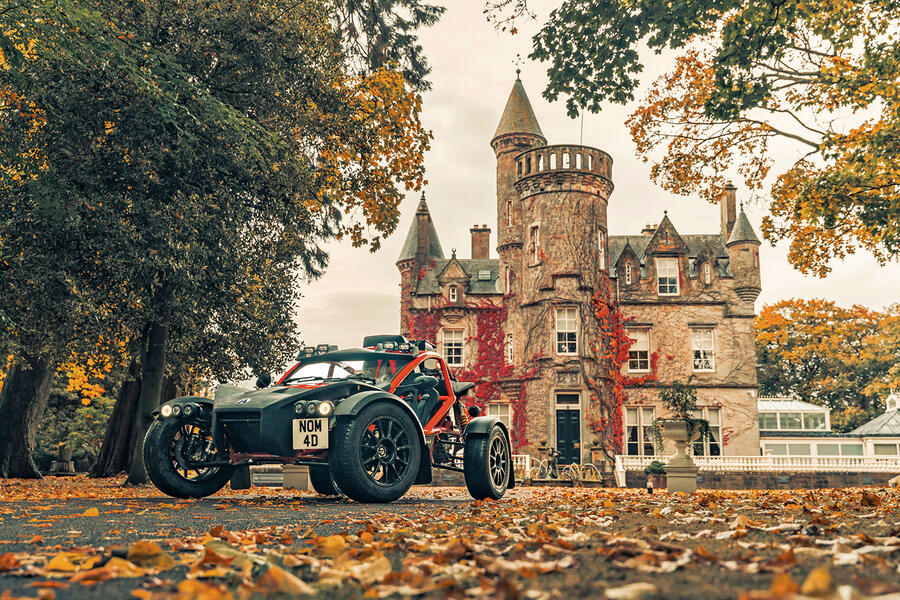
The insectile Nomad couldn’t look more incongruous on my suburban Edinburgh drive, so I install myself in its latticework abdomen, four-point-strapped to the solid composite seat, then start the fuel pump and spook every pet in the postcode by igniting the Ford Focus ST-derived 2.3-litre turbo four-pot.
The stunted exhaust, constantly loud and bassy, is undertoned by a metallic churn from an engine that grows increasingly guttural as we pull away.
It’s only five miles to our first stop, but that’s enough to sample the Nomad’s no-senses-spared modus operandi. I am already a little muddy and have befriended the drum-tight mechanical action of the close-ratio six-speed manual ’box, and I’m fully subscribed to watching the front wheels pivot almost within touching distance.
We’re soon simmering down the drive of the grand, Scots baronial-style Carlowrie Castle, its formal shape still wearing patches of autumn’s crimson ivy. Now a luxury, exclusive-use events venue, Carlowrie was built in 1852 – and it was Hutchison’s life-long home.Â
Today’s custodians maintain a justified reverence for her here, including the annual ‘Isobel Award’ that celebrates unsung community heroes. Within the opulent building, we pore over books, photographs and artefacts plotting her extraordinary life and visit a turret illustrated with her story.Â
Duly humbled by Hutchison’s feats, we burble off as a wedding party arrives. Our next stint involves motorway miles, so I layer up with thermals, waterproofs, a heated gilet, ski jacket, gloves, hat and goggles.
It’s a blustery morning on the M9 towards Stirling and I’m buffeted from both sides of the open cabin, but the windscreen means you don’t have to constantly brace into the breeze as on a motorcycle.
I’m pleasantly reminded of the way a two-wheeler’s engine invigoratingly resonates through your bones, however, largely thanks to the Nomad’s surprisingly comfortable unpadded seat.
It helps make you feel part of the machine, albeit my contribution to the structural rigidity is roughly that of a ham sandwich to a Nomad that is otherwise above 60% stiffer than before.
There’s a bit of fidget from the 60-profile, 235mm-wide Yokohama all-terrain tyres via the unassisted steering, but it’s not intrusive, and while a rear-view mirror would only be filled by the periscope-like air intake that feeds both engine and intercooler, the generous side mirrors help.
I’m warm, comfortable and content as we blare past the Wallace Monument: the car isn’t built for motorways but, in the dry at least, it’s a perfectly viable tool.

We soon enter more natural surroundings for the Nomad on a short B-road stint, where the quick steering and newly even more generous suspension travel begin to chime, before squelching onto a muddy farm track. Here we meet Anna Black who, with her husband Ian, runs Caledonian Christmas Trees.
Following Black’s pick-up along the rutted track, our double wishbones get a workout before my eyes – certainly no need for Land Rover-style wheel-view cameras as you watch the tyres grind across the surface.
Speaking of which, the Ariel has similar ride height and breakover to a coil-sprung Defender 90 and trounces it for approach and departure angles, while its trifling 715kg kerb weight helps negate the need for four-wheel drive. In short, this stuff is meat and drink.
We scatter a gaggle of pheasants turning through a gate and onto a 40-acre plantation: one of several sites over which the Blacks annually harvest 10,000 Christmas trees, mostly destined for garden centres across the country.
Up close, the expanse of dark green cones differentiates into Nordmann Fir, Lodgepole Pine, Norway Spruce and Fraser Fir.
Spruce was favoured by the Victorians, inventors of modern Christmas, and was Hutchison’s choice for Tiree, so we resolve to hunt out a handsome example.
The Nomad tramps up one of the grassy lanes that divide the plantation, and the damp surface poses no traction issues. An incredible, sweet perfume of evergreens drenches the cockpit – yet another sense checked off by this relentlessly immersive machine.
These trees benefit from year-round pruning, shaping and plucking to produce specimens worthy of your living room, and right by the track we find a beautifully symmetrical and bushy Norway Spruce of about 6ft in height.
Black hands me the saw, and moments later the tree is installed in the Nomad’s passenger seat, needled branches bursting sideways and upwards in a spiky green explosion.Â
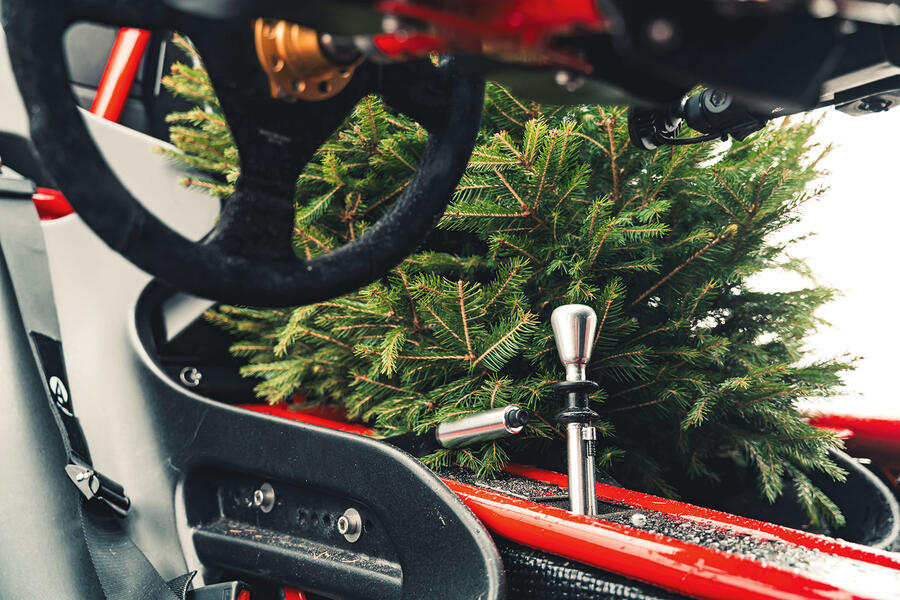
It’s a two-hour drive to Oban to catch the next morning’s ferry to Tiree, and a steady drizzle emerges to accompany the settling gloom.
The smooth and often-glorious Langside road to Comrie is sodden, calling for steady progress through its auburn uplands: traction is strong at the driving wheels, barely bothering the switchable traction control’s middle of seven settings, but the Nomad’s light front end needs care to retain its line.
The final 70 miles are on A-roads, and a deserted stretch alongside Loch Earn shows off the Nomad 2’s flow on quick, gently rolling sweepers. Our car features the essential £1800, three-mode ECU map but, in these conditions, even the standard 260bhp and 284lb ft setting delivers ample, boosty urge between bends.
The steering is keen yet reassuringly linear, and the four-piston AP calipers and discs from the Atom 4 (also optional) scrub speed at will via a brake pedal that’s very easily modulated. At this weight, engine braking proves effective, too.
Beyond Lix Toll, low, white clouds contrast with the black shadows of rivers and lochs beneath before the darkness becomes total. The heated screen and wipers do their best for visibility, and this car features a biblically bright light bar, but the colour TFT instrument display and backlit red ignition button are reflecting in my line of sight, while some key switchgear isn’t illuminated.
These are foibles to be unearthed in a prototype such as this, but they make the final stretch more taxing than it might be and I’m glad of our 10pm arrival in Oban.
Nine hours later, we’re rolling onto Caledonian MacBrayne’s spacious, 99-metre MV Clansman, our prickly passenger drawing mirth from crew and passengers alike. Installed in deck four’s cafe for a generous breakfast, I explain to photographer Max Edleston the principle of link versus Lorne sausage then step outside as day breaks over a flat-calm Sound of Mull.
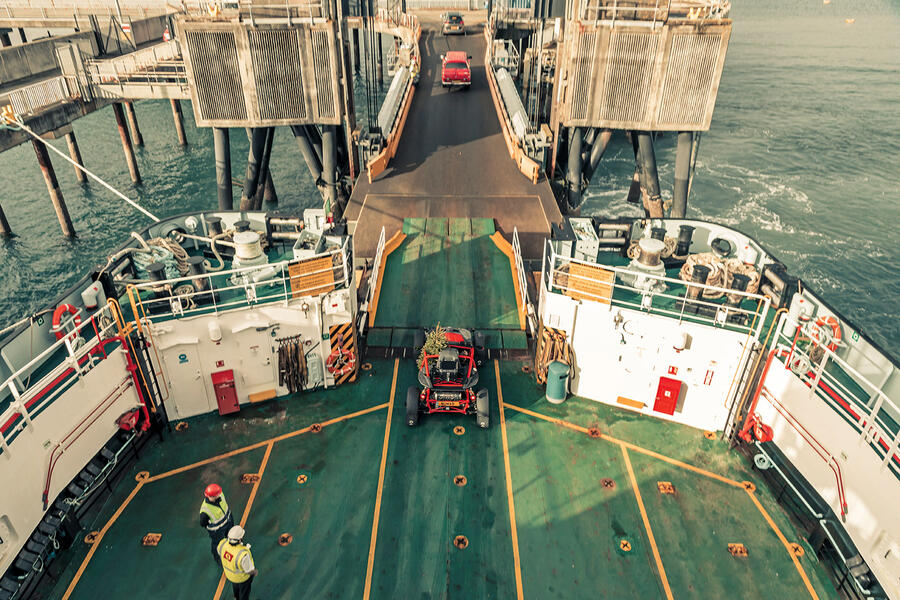
It’s moody, misty and chilly, with shafts of sunlight piercing the blanket of cloud.
Mull is to our left and we cruise past the lush woodland of Aros, from which Hutchison’s conifer was sourced, and the cheerfully coloured front at Tobermory, from where it set sail on 23 December: “The beautiful waving spruce tree, twelve feet or more high, was an unusual spectacle amid the sacks of flour and wooden crates which are the mail-boat’s usual cargo.â€
We continue in comfort through open water and are escorted into Tiree by romping dolphins oblivious to the coming season’s festivities.
On arrival, Hutchison’s description of the island still resonates: “The smooth green machair lands are surrounded by broad white beaches of wet sand, in whose shining surfaces the houses and clouds are reflected as if in a mirror.â€Â
A briny bouquet slaps me in the face as we drive off the Clansman, with the tree’s needles whistling in the sea breeze.
The rough tracks of a century ago, frequented by crofters’ carts filled with crops or fertile seaweed, have been sealed and enhanced with passing places but remain narrow and rippled.
The national speed limit applies, but even on some straights it may as well be unrestricted, because 60mph feels like three figures. I’m surprised to hear, though, that islanders berate tourists not for driving too quickly but too slowly.
There are £6900-worth of optional Öhlins TTX dampers and Eibach springs fitted, which Ariel says are for fast road and race use (there will also be an off-road-focused choice, with the standard set-up in between). Initially, it thumps a bit on ridges and is overly reactive on bumps, but a hex-key slackening of the reservoirs’ low-speed compression adjustment smooths things off, allowing the Nomad to parry rather than buck.
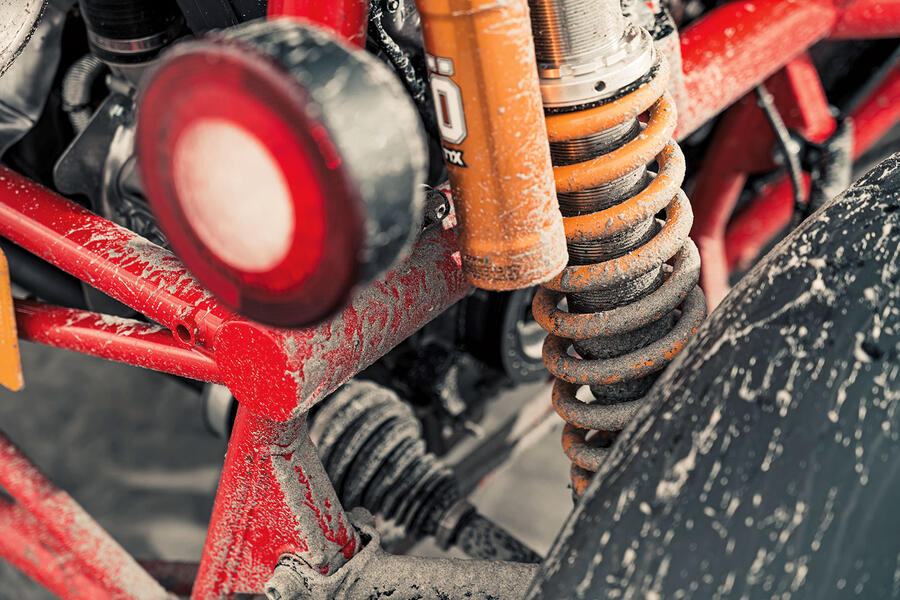
On the dry and quiet single-track roads, I switch the ECU to its 305bhp, 382lb ft maximum, and the result is a bit like being towed down a garden path by an SR-71 Blackbird.
Following a pronounced gulp of forced induction, there’s mighty and sustained pull above 2000rpm and the deep, bellowing exhaust is punctuated by fits of thrashing from the turbo and refreshingly uncontrived pops on the overrun.
In fact, it’s more push than pull, as the rear hunkers down on its generous springs and boots the Nomad onwards. Roll is pronounced, too, but given the steering’s unerring faithfulness and the security of the Willans harnesses, it threatens neither stability nor comfort and positively contributes to engagement.
The nose is tacked down now, and with the traction control eased there’s a brief slide available from the rear through tight bends as light sand billows around us like icing sugar. Driving the Nomad here is an addictively intense experience.
It’s only a 30-minute drive end to end, but every road on Tiree seemingly leads to another gorgeous, silvery beach lapped by luminous blue water: surfers and windsurfers are spoiled for choice.
But in Hutchison’s day, they were as useful as they were beautiful: “The level sands of Tiree furnish the islanders with their best roads and form splendid natural highways, repaired twice daily by the tide. The long drive or walk over these on first arrival is a delightful and uncommon experience.
“The tree was met by the minister himself and triumphantly conveyed in his pony-trap across three miles of glittering sands to its destination at the little chapel of Ruaig.â€
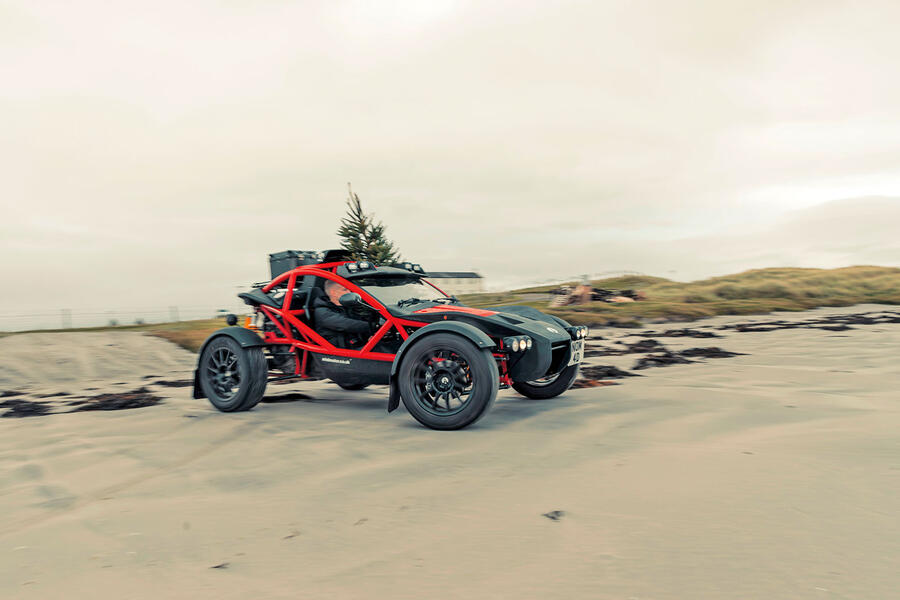
Retracing the clergyman’s tracks, we clamber over the verge onto sprawling Gott Bay beach – Tiree’s longest, and a full 300m wide at today’s low tide.
The mirror finish promised by Hutchison endures, and huge flocks of birds swoop towards their own reflections, undeterred by the Nomad’s visual and aural noise.
Thankfully, none tries to nest in us. Washboard ridges are smoothed out with a little speed, although the slimmest layer of standing water prompts gentle fishtailing from both ends as the helm goes light.
The minister’s nag would have calmly plodded through the several burns that traverse the beach, whereas Nomad, spruce and driver alike get drenched by water bombs as if each front wheel has disturbed a landmine. The east end of the beach is dead smooth and firm, and I resist a strong urge to untie all the horses.
Some call Tiree ‘the Hawaii of the north’, but it could equally be Scotland’s Pendine or Daytona. It’s barely a minute from the beach’s terminus to the tiny chapel, built in the 1850s and once home to a happy congregation of 400.
During Hutchison’s visit it was used as a temporary classroom following a schoolhouse fire; now it’s home to artist Matt MacIntyre and his wife Christine, with the ‘machair’ – the wild, coastal meadows – their broad, green driveway on which the sand shakes from our tyres.
Along with friends and family, they give us a warm island welcome, with home baking and tea. Christine attended Sunday school here as a child before the chapel closed around 1970; Matt bought it unseen as a shell to renovate in 1998.
“I cried when I saw the state of it,†he says. “There was sand on the floor, skeletons of hares and sheep and old oars lying around.†Now it’s a cosy cottage-cum-studio with heavenly coastal views.
But we have one final duty to perform, as Hutchison wrote: “There was much excitement when the waving green tips were pushed through the doorway. The tree was carried in like a gigantic baby in the arms of three of the older boys and deposited along the backs of the pews against the wall, where it exhaled a delightfully fresh odour of resinous sap in the stuffy little chamber.â€
Matt, his grandson Matthew and I loose the spruce from the Nomad, lift it inside, mount and light it by the window, whose sill is fashioned from one of the very same initial-carved pews.Â
A centenary tree for treeless Tiree.Â
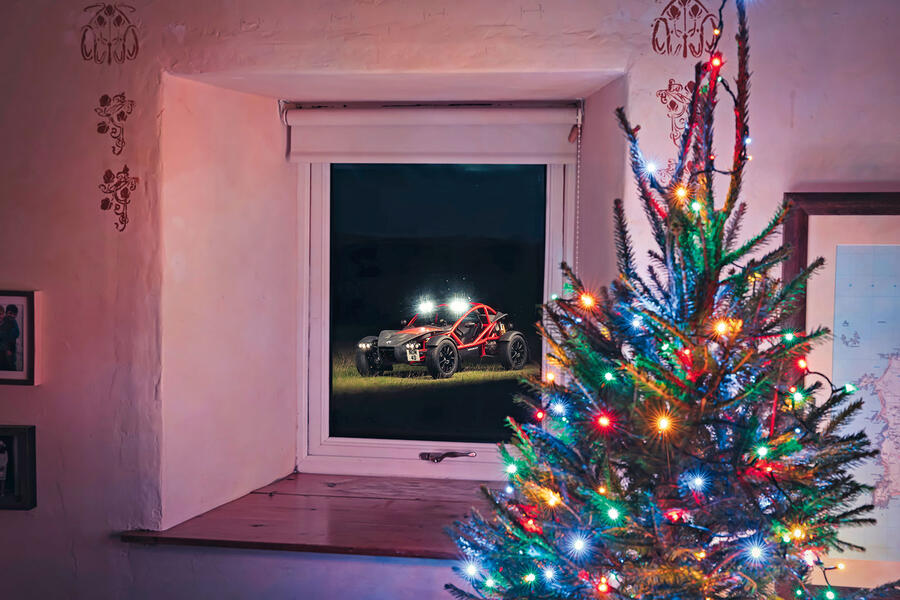
A life less ordinary
Across her 92 years that spanned from Queen Victoria to Thatcher, Isobel Wylie Hutchison quietly yet determinedly overachieved.
The head start of a privileged childhood gave way to tragedy and turmoil after her father and brothers died in her youth, but Hutchison found both solace and fascination in exploration.
Scottish walks, such as the 150-mile length of the Outer Hebrides, led to a solo 260-mile crossing of Iceland in 1925, completed in just 14 days. Immersive stints in Greenland and a six-month odyssey across Alaska and the Yukon followed. She learned the native language of each.
She preferred to walk but would travel by any means necessary: Bellanca mail plane on skis, wood-burning paddle steamer, ice-breaking schooner pungent with seal blubber, pony, kayak or dog-sledding at -41deg C.
Her works as a writer, poet, botanist, speaker, artist and documentary maker found homes with National Geographic, Kew Gardens, the British Museum, the BBC and the Royal Scottish Geographical Society.
Two of her great loves – Scotland and Christmas – travelled with her, from a kilt worn over Inuit sealskin boots to provisions including “my Christmas dinner of tinned haggis, tinned plum pudding and a bottle of French brandy with which to set the puddings ablazeâ€.
